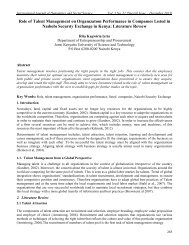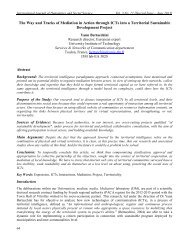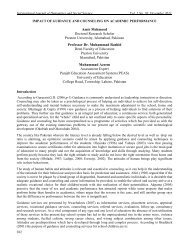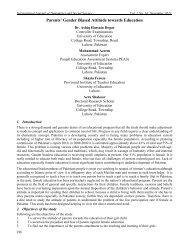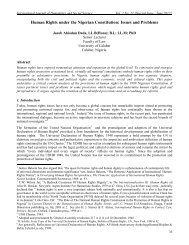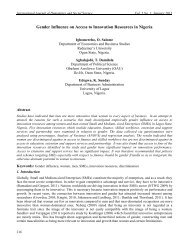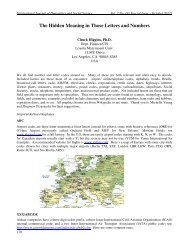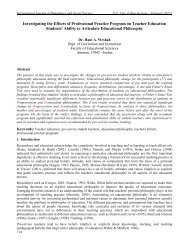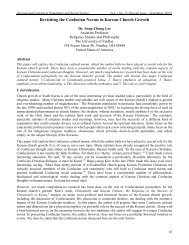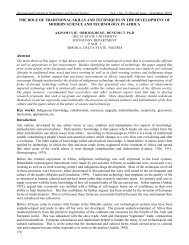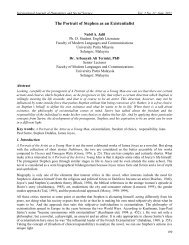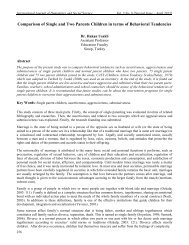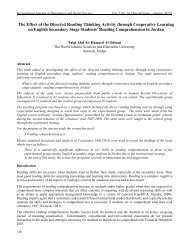The Teachings of Death as Depicted in Tshivenda Folklore
The Teachings of Death as Depicted in Tshivenda Folklore
The Teachings of Death as Depicted in Tshivenda Folklore
You also want an ePaper? Increase the reach of your titles
YUMPU automatically turns print PDFs into web optimized ePapers that Google loves.
International Journal <strong>of</strong> Humanities and Social Science Vol. 2 No. 20 [Special Issue – October 2012]<br />
<strong>The</strong> <strong>Teach<strong>in</strong>gs</strong> <strong>of</strong> <strong>Death</strong> <strong>as</strong> <strong>Depicted</strong> <strong>in</strong> <strong>Tshivenda</strong> <strong>Folklore</strong><br />
Pr<strong>of</strong> N. M. Musehane<br />
M.E.R Mathivha Centre fort African Languages, Arts and Culture<br />
School <strong>of</strong> Human and Social Sciences, University <strong>of</strong> Venda<br />
Private Bag X5050,Thohoyandou 0950,Limpopo Prov<strong>in</strong>ce<br />
Abstract<br />
<strong>Folklore</strong>,like all genres <strong>of</strong> literature <strong>in</strong> <strong>Tshivenda</strong>,teaches people morals <strong>in</strong> <strong>as</strong>pects such <strong>as</strong> love,death,economy<br />
,legal and life <strong>in</strong> general.<strong>Death</strong> is one <strong>of</strong> the themes found <strong>in</strong> folkloe that teaches morals <strong>in</strong> humanity.<strong>The</strong> aim <strong>of</strong><br />
this paper is to <strong>in</strong>vestigate the teach<strong>in</strong>gs <strong>of</strong> morals brought by death <strong>as</strong> depicted <strong>in</strong> <strong>Tshivenda</strong> folklore.<strong>The</strong><br />
researcher would accomplish this by analys<strong>in</strong>g more thantwo thousand proverbs, praise forms,praise<br />
names,riddles idioms etc,from published and unpiublished literary works .<strong>The</strong>se <strong>as</strong>pects <strong>of</strong> folklore would be<br />
subjected to a sociological theories to f<strong>in</strong>d out how death is depicted <strong>in</strong> teach<strong>in</strong>gs <strong>of</strong> morals to the Vhavenda<br />
community.<br />
Introduction<br />
<strong>Folklore</strong> literature h<strong>as</strong> been def<strong>in</strong>ed by <strong>The</strong> Encyclopedia Britannica Eleven Edition Vol. 7 <strong>of</strong> 1911:45 <strong>as</strong> the lore<br />
chiefly <strong>of</strong> unlettered peoples transmitted by the word <strong>of</strong> mouth. This type <strong>of</strong> literature consists <strong>of</strong> prose and verse<br />
narrative, poems and songs, myths, drama, rituals, proverbs, riddles and the like. In this juncture the follow<strong>in</strong>g<br />
will be dealt with I.e. proverbs riddles and praise forms and praise forms or names <strong>as</strong> short forms. This literature<br />
exists <strong>in</strong> manuscripts and books and may be preserved exactly <strong>as</strong> authors or authors left it, even through this.<br />
It may happens that the speaker <strong>of</strong> s<strong>in</strong>ger have heard it before and it carries a tradition that he h<strong>as</strong> left from<br />
speakers and delivers it to a liv<strong>in</strong>g audience .It may happen aga<strong>in</strong> that the listeners have heard this material many<br />
times before and that it h<strong>as</strong> a vigorous life <strong>in</strong> the community, and they will see to it that he does not depart too far<br />
from traditions they know it. If this is acceptable, it could be repeated over and over aga<strong>in</strong> <strong>as</strong> long <strong>as</strong> it appeals to<br />
human lives both men and women.<br />
Praise forms or praise names<br />
Names <strong>of</strong> people may carry many mean<strong>in</strong>gs. A name is a word or group <strong>of</strong> words used to refer to and <strong>in</strong>dividual<br />
entity (real or imag<strong>in</strong>ary);the name s<strong>in</strong>gles out this quality by directly po<strong>in</strong>t<strong>in</strong>g to it ,not by specify<strong>in</strong>g it <strong>as</strong> a<br />
member <strong>of</strong> cl<strong>as</strong>s{che <strong>of</strong> the important elements if nam<strong>in</strong>g process concerns the mean<strong>in</strong>g and <strong>as</strong>sociates <strong>of</strong> the<br />
name In most c<strong>as</strong>es people may be given certa<strong>in</strong> names that are good, likeable, and propitious names. Sometimes<br />
children are given bad names with the mean<strong>in</strong>g <strong>of</strong> <strong>in</strong>form<strong>in</strong>g them or communicat<strong>in</strong>g ugly happen<strong>in</strong>gs,<br />
disagreeable or crippled. <strong>The</strong> purpose <strong>of</strong> such names is apostrophic names t0o make the child to be undesirable to<br />
demons.<br />
Analysis <strong>of</strong> <strong>Tshivenda</strong> names depict<strong>in</strong>g death<br />
Mush<strong>in</strong>, (1999:14) <strong>in</strong>dicated that places may be named accord<strong>in</strong>g to historical events.Acccord<strong>in</strong>g to him ’by<br />
historical events is meant the occurrence <strong>of</strong> someth<strong>in</strong>g <strong>in</strong> life <strong>of</strong> a people. People or places <strong>in</strong> Venda are be<strong>in</strong>g<br />
named <strong>in</strong> commemoration <strong>of</strong> events such <strong>as</strong> listed below<br />
<strong>The</strong> name Mukandangalwo.’one walk with it (death)’<br />
<strong>The</strong> name Mukandangalwo is given to both males and females. <strong>The</strong> name is literally translated <strong>as</strong> ‘I walk with it’.<br />
It means the ‘one who walk with it’. When the name is praised it state that Mukangangalwo mupfa wa<br />
mulenzheni.This means one who walks with it is a thorn <strong>in</strong> one’s foot. One always walks with death like a person<br />
who is walk<strong>in</strong>g with a thorn prick<strong>in</strong>g under one’s foot<br />
197
<strong>The</strong> Special Issue on Arts and Humanities © Centre for Promot<strong>in</strong>g Ide<strong>as</strong>, USA www.ijhssnet.com<br />
<strong>The</strong> name is means that death is someth<strong>in</strong>g one walks with it. One should not run away from death because one is<br />
borne to die. One is given this name to refer to him that one should knot wait that people are borne to die and not<br />
run away from it. <strong>Death</strong> is considered to be at every person like one who is walk<strong>in</strong>g on footpath who could be<br />
pricked by thorn anytime. <strong>The</strong> word is a compound formed by prefix- Mu- followed by the verb stem-kanda,<br />
followed by a preposition nga and followed by pronoun –lwo stand<strong>in</strong>g for lufu’death’<br />
<strong>The</strong> name Aluimelwi’One does not wait for it’ (death)<br />
<strong>The</strong> name may be given to both male and female. It means that ‘one should not wait for it’. In this juncture when<br />
death come to you or threatened by anyth<strong>in</strong>g which may cause death, one should run away and not to wait for the<br />
death to catch up. <strong>The</strong> name is given to a person to be forewarned that one should not procr<strong>as</strong>t<strong>in</strong>ate if death is<br />
com<strong>in</strong>g. In other words you should run away from death and not wait until death comes to you.<br />
<strong>The</strong> name Musiwalwo’ on its (death) day’<br />
<strong>The</strong> name Musiwalwo may be given to both male and female. It may be loosely translated <strong>as</strong> ‘the day <strong>of</strong> death’.<br />
This means that the day <strong>of</strong> death one may do someth<strong>in</strong>g unbecom<strong>in</strong>g or if death is com<strong>in</strong>g to a person it would not<br />
first report that it is com<strong>in</strong>g. It just comes unexpectedly. <strong>The</strong>re is no time which death could tell one that it is<br />
com<strong>in</strong>g to fetch him or her. It just come without tell<strong>in</strong>g one whether that it w<strong>as</strong> com<strong>in</strong>g .<strong>The</strong> name is a compound<br />
formed by conjunction musi which refers to time followed by possessive concord wa followed by pronoun -lwo<br />
stand<strong>in</strong>g for death.<br />
Proverbs referr<strong>in</strong>g to death<br />
Musehane (1986:65) quoted Guma (1983:65) def<strong>in</strong><strong>in</strong>g a proverb <strong>as</strong> a pithy sentences with the general bear<strong>in</strong>g on<br />
life. It serves to express some homely truth or moral lesson <strong>in</strong> such an appropriate manner <strong>as</strong> to make one feel that<br />
no better words could have been used to describe the particular situation<br />
Proverb U tshi suma muhulu lufu u suma u tshi lu divha’When report<strong>in</strong>t death to elderly person, do so<br />
know<strong>in</strong>gly’<br />
<strong>The</strong> above mentioned proverb refers to death. It means that if you report death to an elderly person you should do<br />
so when know<strong>in</strong>g all the details. <strong>The</strong> elderly people are full <strong>of</strong> questions. <strong>The</strong>y may <strong>as</strong>k when the person died,<br />
when and where is go<strong>in</strong>g to be buried. If you lack that matter you are forbidden to report because you will not<br />
have the facts. This proverb refers to any other matters <strong>in</strong> general. You must tell someone an issue that you<br />
understand and know all about it.<br />
Proverb Mutani wa lufu, hu dzulwa a siho ‘<strong>The</strong> family <strong>of</strong> the dece<strong>as</strong>ed people get there after his/her death’<br />
<strong>The</strong> proverb is literally means that you enter <strong>in</strong>to a homestead after the owner h<strong>as</strong> p<strong>as</strong>sed away. This means that<br />
many people enter the homestead after the death <strong>of</strong> the owner. Without death his services would not be considered<br />
but after the death <strong>of</strong> the owner <strong>of</strong> the homestead, men would be required to give <strong>as</strong>sistance and therefore would<br />
enter the homestead.<br />
Proverb Muthu ifa hu sale dz<strong>in</strong>a’one dies leav<strong>in</strong>g good name beh<strong>in</strong>d’<br />
<strong>The</strong> above proverb is literally means that you should always do well so that when you die you should keep your<br />
name clean. This means one should leave beh<strong>in</strong>d a good name or history after their death. <strong>The</strong> proverb is<br />
encourag<strong>in</strong>g people to do good th<strong>in</strong>s while still alive so that they could leave beh<strong>in</strong>d a clean name<br />
Proverb Lufu a lu rovhedzwi ‘<strong>Death</strong> cannot be challenged to prove a statement’<br />
<strong>The</strong> above proverb means that one should not mock one who h<strong>as</strong> death <strong>in</strong> the family because death does not<br />
choose people. It could still come to you <strong>as</strong> a family. Do not laugh at one who h<strong>as</strong> death <strong>in</strong> a family.<br />
Proverb Lufu a lu sengiswi ‘<strong>Death</strong> is not takento court’<br />
No one should question about death. No one should question why death h<strong>as</strong> visited one’s family. <strong>Death</strong> does not<br />
specifically choose a person <strong>in</strong> order to punish him or her but it depends on the time. It may still come.<br />
198
International Journal <strong>of</strong> Humanities and Social Science Vol. 2 No. 20 [Special Issue – October 2012]<br />
Proverb Lufu a lu taliwi ’Do not divorce death’<br />
This proverb refers s to one who w<strong>as</strong> married to a person .If that person meets dearth one should not say he is no<br />
longer my relative because <strong>of</strong> marriage. It tells that one should not divorce death. When one’s husband or wife is<br />
dead one should stay at the <strong>in</strong>-laws and must not go away. <strong>The</strong> proverb is warn<strong>in</strong>g young ladies that when their<br />
husbands die the y should not go back to their parents’ families. <strong>The</strong>y must stay with the <strong>in</strong>-laws.<br />
Proverb Lufu lu a vhidza lwo aravha khunda’ <strong>Death</strong> lures one’<br />
<strong>The</strong> proverb teaches one that if the time <strong>of</strong> dy<strong>in</strong>g h<strong>as</strong> arrived one would have to die and no one would stop it. This<br />
proverb warn one who would be under the experienced doctor and question how should he die while he one is<br />
under <strong>in</strong>tensive care <strong>of</strong> experienced doctors. <strong>The</strong> answer is that if death comes to a person and it is his or her day<br />
<strong>of</strong> dy<strong>in</strong>g, no-one will stop it.<br />
Proverb Lufu lu tanganywa nga thangu.’People meet dur<strong>in</strong>g death rituals’<br />
<strong>The</strong> proverb is loosely translated <strong>as</strong> the difference because <strong>of</strong> one’s death ,people who do not see eye to eye would<br />
meet<strong>in</strong>g when they go to an traditional doctor to go and found out what killed the person. <strong>The</strong> death <strong>of</strong> a family<br />
member may make people <strong>of</strong> the same family differ <strong>in</strong> certa<strong>in</strong> issues. <strong>The</strong>y would not visit each other. But<br />
accord<strong>in</strong>g to Venda custom and tradition all members <strong>of</strong> the family should go together to a traditional doctor to<br />
f<strong>in</strong>d out what had killed the person. <strong>The</strong> proverb says that although people cold differ, they would come<br />
tp0getherthe day when they go together to the traditional doctor s<strong>in</strong>ce all members <strong>of</strong> the family should go<br />
together without one stay<strong>in</strong>g beh<strong>in</strong>d.<br />
Proverb Lufu lu shaya sia’<strong>Death</strong> does not take side’<br />
<strong>The</strong> proverb is loosely <strong>in</strong>terpreted <strong>as</strong> death or accident is not meant for specific people. When dearth after death<br />
follow <strong>in</strong> a family one may th<strong>in</strong>k what wrong I did. One may question oneself that if I had committed any<br />
wrongdo<strong>in</strong>g may God forgive me because everyth<strong>in</strong>g terrible is com<strong>in</strong>g on my way .<strong>Death</strong> do not choose people<br />
for a re<strong>as</strong>on .If death is com<strong>in</strong>g to one’s family it would come without anybody h<strong>in</strong>der<strong>in</strong>g its com<strong>in</strong>g.<br />
Proverb Lufu a lu s<strong>in</strong>delwi mbuvha ‘One cannot prepare for death’<br />
Accord<strong>in</strong>g to Venda custom and tradition when one undertakes a journey one should w<strong>as</strong>h clothes. One should<br />
prepare provision to take along. When on the way one would enjoy oneself with the provision. <strong>The</strong> rema<strong>in</strong><strong>in</strong>g<br />
provision would be left for the relatives where one is go<strong>in</strong>g to visit. In this proverb one is told that if one is dy<strong>in</strong>g<br />
one would have no time <strong>of</strong> preparation. In other words an accident or death when it comes to people one does not<br />
have time to prepare for it. <strong>The</strong> proverb teaches us that we should be prepared to die any time.<br />
Proverb Lufu lwa sw<strong>in</strong>a ndi lwau ‘<strong>The</strong> death <strong>of</strong> one’s enemy is yours’<br />
<strong>The</strong> proverb is loosely translated <strong>as</strong> the dearth <strong>of</strong> the enemy is still your death. Although death or an accident falls<br />
your enemy one should be concerned .<strong>Death</strong> is the enemy <strong>of</strong> human bengs.<strong>Death</strong> is an enemy to every one. When<br />
your enemy meets death you should be concerned s<strong>in</strong>ce you are also a human be<strong>in</strong>g.<br />
Proverb Lufu ndi gwengo li hwengaho thungo dzothe, a lu taluli ’<strong>Death</strong> does not take sides’<br />
<strong>Death</strong> is loosely transited <strong>as</strong> a curved arrow or spear blade <strong>in</strong>serted <strong>in</strong>to a short haft and used to smoothen the<br />
<strong>in</strong>side <strong>of</strong> a wooden vessels which kills people every where <strong>in</strong> large numbers without choos<strong>in</strong>g people. Accord<strong>in</strong>g<br />
to this proverb, death is seen com<strong>in</strong>g to every body without select<strong>in</strong>g .It comes to everyone<br />
Proverb Lufu ndi kh<strong>of</strong>he’ <strong>Death</strong> is sleep<strong>in</strong>g’<br />
Accord<strong>in</strong>g to the <strong>Tshivenda</strong> culture and tradition death comes unexpectedly .<strong>Death</strong> is like sleep i.e. it comes<br />
suddenly, unexpectedly without any warn<strong>in</strong>g. <strong>Death</strong> comes anytime to a person.<br />
Proverb Lufu ndi mueni ‘<strong>Death</strong> is a visitor’<br />
<strong>The</strong> proverb is loosely translated <strong>as</strong> death is like a visitor. A visitor comes any time <strong>of</strong> the day.So; death is like a<br />
visitor because it comes anytime without <strong>in</strong>vitation. <strong>The</strong> proverb teaches us that there is no time <strong>of</strong> preparation for<br />
death because it may come to one at any time<br />
199
<strong>The</strong> Special Issue on Arts and Humanities © Centre for Promot<strong>in</strong>g Ide<strong>as</strong>, USA www.ijhssnet.com<br />
Proverb Lufu ndi nama ya ditilili’<strong>Death</strong> is difficult’<br />
An accident or dearth is difficult to accept like a piece <strong>of</strong> meat which is hard to chew. One should just accept<br />
death <strong>of</strong> an accident s<strong>in</strong>ce one can not change it<br />
Idioms referr<strong>in</strong>g to death<br />
An idiom is a phr<strong>as</strong>e which means someth<strong>in</strong>g different from the mean<strong>in</strong>gs <strong>of</strong> the separate words. In this c<strong>as</strong>e the<br />
idiom referr<strong>in</strong>g death <strong>as</strong> subject under scrut<strong>in</strong>y w<strong>as</strong> established. <strong>Death</strong> can be depicted <strong>in</strong> idioms and the<br />
follow<strong>in</strong>g are examples<br />
(a) U sia vhathu-literal mean<strong>in</strong>g he/she left the people-died<br />
(b) U raha bakete- to kick the backet-died<br />
(c) U nala vhuswa-to stop do<strong>in</strong>g someth<strong>in</strong>g because <strong>of</strong> hav<strong>in</strong>g taken <strong>of</strong>fence; to refuse porridge- died<br />
Conclusion<br />
<strong>The</strong> proverbs are diverse <strong>in</strong> <strong>Tshivenda</strong> and they show different mean<strong>in</strong>gs such <strong>as</strong> death.It w<strong>as</strong> found that proverbs,<br />
praise form, praise names, riddles and idioms from published and unpublished literary workd depicted the<br />
teach<strong>in</strong>gs <strong>of</strong> death <strong>in</strong> our Tshivendsa community.<br />
References<br />
Guma, S.M 1993: <strong>The</strong> Form, Content and Technique <strong>of</strong> Traditional Literature <strong>in</strong> Southern Sotho, Pretoria,<br />
J.L.Van Schaik<br />
Musehane, N.M. 1986: An Analysis <strong>of</strong> the Development <strong>of</strong> Communication <strong>in</strong> Venda Culture, Unpublished Hons<br />
B.A. (Communication) Dissertation, University <strong>of</strong> South Africa, Pretoria<br />
<strong>The</strong> Encyclopedia Britannica Eleven Edition, Vol 7 <strong>of</strong> 1911<br />
<strong>Tshivenda</strong> LRD (n.d) : Tshisiku tsha Mirero ya Tshivendsa, Unpublished Manuscripts+, University <strong>of</strong> Venda,<br />
Thohoyandou<br />
<strong>Tshivenda</strong> LRDC (n.d): Vhutali ha Mirero ya <strong>Tshivenda</strong>, Unpublished Manuscripts, University <strong>of</strong> Veda,<br />
Thohouyandou<br />
Van Warmelo, N.J 1989: Venda Dictionary, J.L Van Schaik, Pretoria<br />
200



